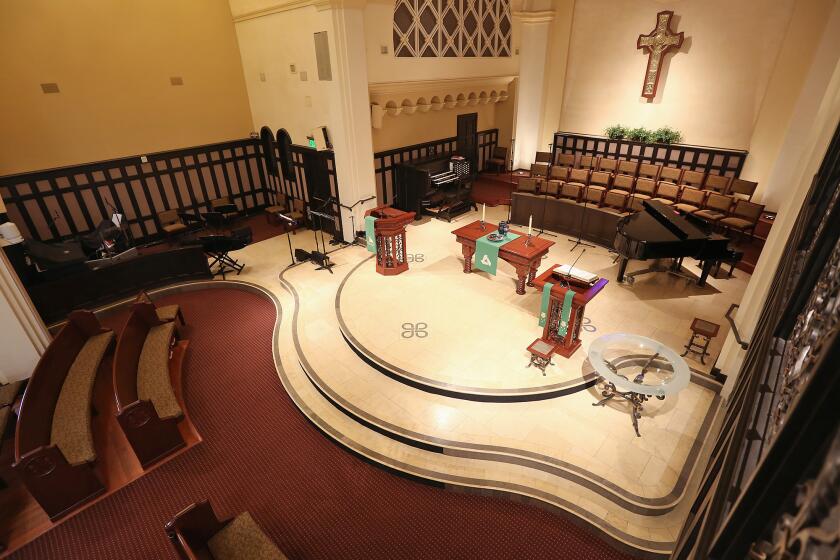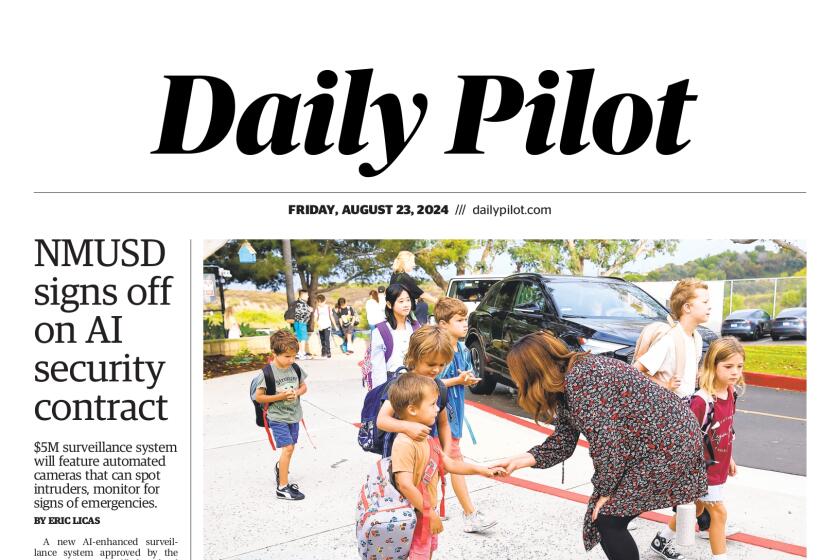A matter of the heart
Deepa Bharath
When Newport Harbor High School sophomore Eric Licata went to the
dentist’s office two years ago to get his wisdom teeth removed, he
never imagined getting the shock of his life.
At the time, Eric was immersed in high school sports. He was on
the Sailors’ basketball and baseball teams. Sports were his life --
his dream and his reality.
Then the oral surgeon detected something abnormal about his heart
and asked him to follow it up. Eric was diagnosed with a serious,
possibly lethal heart condition.
“Eric never had any problems,” his mother Linda Licata said. “And
if he could have problems, any kid could have problems.”
So Licata, at her son’s request, sought the help of a national
foundation to organize Newport Harbor High School’s first-ever, free,
echocardiogram screenings for athletes and coaches at the school,
scheduled for Monday.
Eric found the Chad Foundation’s website while he was surfing the
Internet to look up information on his heart condition, he said. Chad
Alan Butrum, a football player who was 26 years old, died in April
1994 of a sudden cardiac death. His mother, Arista, said she started
the New York City-based foundation in her son’s name and has offered
free screenings in five states since July 2000.
“It costs about $2,500 to get an echocardiogram, and insurance
won’t cover it unless someone is having symptoms,” said Arista, who
uses no last name.
The cost is a major reason why it is so easy for such serious
conditions to slip under the radar and remain undetected in young,
seemingly healthy athletes who end up dying tragically and
unnecessarily, Arista said.
The foundation operates with equipment loaned to it by Philips
Medical Systems, she said. There will be two machines available for
the Newport Beach screenings, according to Arista.
A screening is much like an ultrasound screening in pregnant women
and takes about five minutes per person, unless the examiner detects
something abnormal, Arista said. Follow-up is vital in such
situations, she said.
“We had a case where examiners spotted something abnormal in a
young man, but he went away on a vacation with his family two weeks
right after his screening, and in that time, suffered a sudden
cardiac death,” she said.
The screenings are a great opportunity for the school’s athletes,
said Assistant Principal Robert Cunard.
“This is the first time it’s happening in our school, and we’re
definitely hoping that it would be an annual event here,” he said.
The school district is no stranger to sudden cardiac deaths.
Newport Harbor High’s Gray Lunde died in 1995 as he warmed up for a
water polo practice in the swimming pool. He was said to have had a
congenital heart problem.
Had this technology been available years ago, it could have saved
his life, said Lunde’s brother, Ty Lunde, a paramedic with the
Newport Beach Fire Department.
“It’s also good to create an awareness on the subject,” he said.
More recently, three years ago, Brian Sweet, a Newport Harbor High
graduate, died after collapsing on the bleachers during an informal
practice run at Orange Coast College, where he was a member of the
crew team.
Since his diagnosis, Eric Licata has been prohibited from playing
organized sports for now, but he remains on the basketball team,
helping his friends and team members with practice drills.
“Whatever I can do, I do,” he said. “I know I’ll never get a
sports scholarship for college or anything. But I want to remain
involved in some way.”
Eric was the one who wanted the Chad Foundation to come to his
high school and conduct the screenings.
“It was important to me, because I knew what I went through,” he
said. “If I knew nothing was wrong with me, no one else knows
either.”
For Arista, the biggest satisfaction in offering the screenings
comes from knowing it will save lives.
“A young life that’s gone doesn’t affect one family alone,” she
said. “It affects an entire community.”
* DEEPA BHARATH is the enterprise and general assignment reporter.
She may be reached at (949) 574-4226 or by e-mail at
deepa.bharath@latimes.com.
All the latest on Orange County from Orange County.
Get our free TimesOC newsletter.
You may occasionally receive promotional content from the Daily Pilot.



